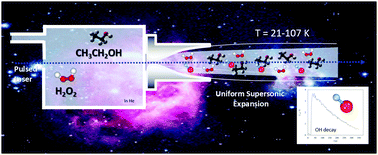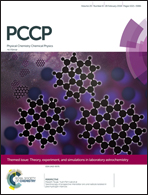Gas phase kinetics of the OH + CH3CH2OH reaction at temperatures of the interstellar medium (T = 21–107 K)†
Abstract
Ethanol, CH3CH2OH, has been unveiled in the interstellar medium (ISM) by radioastronomy and it is thought to be released into the gas phase after the warm-up phase of the grain surface, where it is formed. Once in the gas phase, it can be destroyed by different reactions with atomic and radical species, such as hydroxyl (OH) radicals. The knowledge of the rate coefficients of all these processes at temperatures of the ISM is essential in the accurate interpretation of the observed abundances. In this work, we have determined the rate coefficient for the reaction of OH with CH3CH2OH (k(T)) between 21 and 107 K by employing the pulsed and continuous CRESU (Cinétique de Réaction en Ecoulement Supersonique Uniforme, which means Reaction Kinetics in a Uniform Supersonic Flow) technique. The pulsed laser photolysis technique was used for generating OH radicals, whose time evolution was monitored by laser induced fluorescence. An increase of approximately 4 times was observed for k(21 K) with respect to k(107 K). With respect to k(300 K), the OH-reactivity at 21 K is enhanced by two orders of magnitude. The obtained T-expression in the investigated temperature range is k(T) = (2.1 ± 0.5) × 10−11 (T/300 K)−(0.71±0.10) cm3 molecule−1 s−1. In addition, the pressure dependence of k(T) has been investigated at several temperatures between 21 K and 90 K. No pressure dependence of k(T) was observed in the investigated ranges. This may imply that this reaction is purely bimolecular or that the high-pressure limit is reached at the lowest total pressure experimentally accessible in our system. From our results, k(T) at usual IS temperatures (∼10–100 K) is confirmed to be very fast. Typical rate coefficients can be considered to range within about 4 × 10−11 cm3 molecule−1 s−1 at 100 K and around 1 × 10−10 cm3 molecule−1 s−1 at 20 K. The extrapolation of k at the lowest temperatures of the dense molecular clouds of ISM is also discussed in this paper.



 Please wait while we load your content...
Please wait while we load your content...